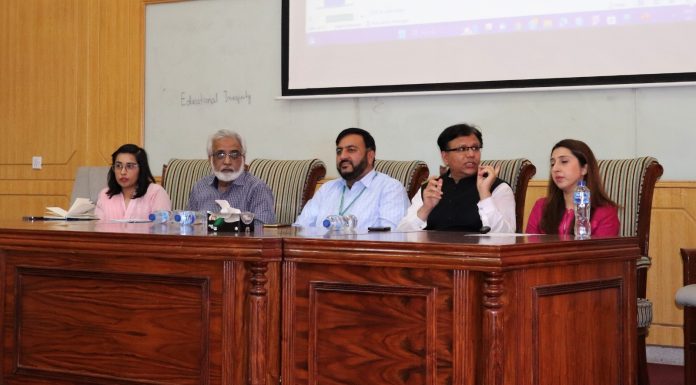By Ali Imran
ISLAMABAD: The Institute of Urbanism (IoU) on Wednesday initiated its Green Urban Development (GUD) programme with a special focus on the life cycle approach to sustainable Urban Development through capacity enhancement and fostering partnership among multi-stakeholders including the public sector, youth, policymakers and media.
The focused group discussion and awareness sessions were organized for students and subject experts of Quaid-e-Azam University (QAU).
Head of Department, Environmental Sciences Department of QAU, Dr Sohail Rana, introduced the audience to the agenda of the session and welcomed the guests, here on Wednesday.
Dr Rana said that the sessions were aimed to encourage students and experts to have an understanding of the GUD program and related activities.
Managing Director (MD) of the School of Leadership Foundation (SoLF), Maryam Irfan briefed the audience that GUD was a joint initiative of the Institute of Urbanism (IoU) and the SoLF with the financial support of the US Embassy.
She shared, “The programme has three key thematic areas; water conservation, green infrastructure and waste management in the urban developed landscape.
The program is divided into two phases; research on the urban development landscape, and establishment of a platform for building capacity & facilitating synergies among relevant stakeholders.”
While explaining the segments of GUD program, Maryam said that it has two segments; Green Urban Development School (GUDS) and Urban Co-Creation Hub (UCCH).
At GUDS, knowledge of young people is being enhanced through action research and incubation of green ideas to business case, leading to green entrepreneurship. GUDS has been established in public universities under the government-led Green Youth Movement (GYM) Clubs.
After the awareness session, a focused group discussion was conducted by Program Coordinator of IoU Ayesha Majid. She explained, “The program has three phases. In the first phase, 16 interactive sessions and four exposure visits will be organized for shortlisted students. In the second phase, students will be further mentored for three months for their research.”
“In the last phase, research will be evaluated and winners will move to the green startup phase. The winner will get another round of stipend to further work on the research and convert the idea into a business and also establish market linkages for sustainable green urban development.”
Ayesha further said, “Actors from various government institutions, policymakers, media, private sector and civil society working on urban environmental and climate-related issues will be brought together in a co-creation space for dialogues, hackathons and seminars to discuss and work together on issues pertaining to urban development.”
She mentioned the challenges faced by young graduates to convert their ideas into real-time entrepreneurship and how they could deal with these challenges.




